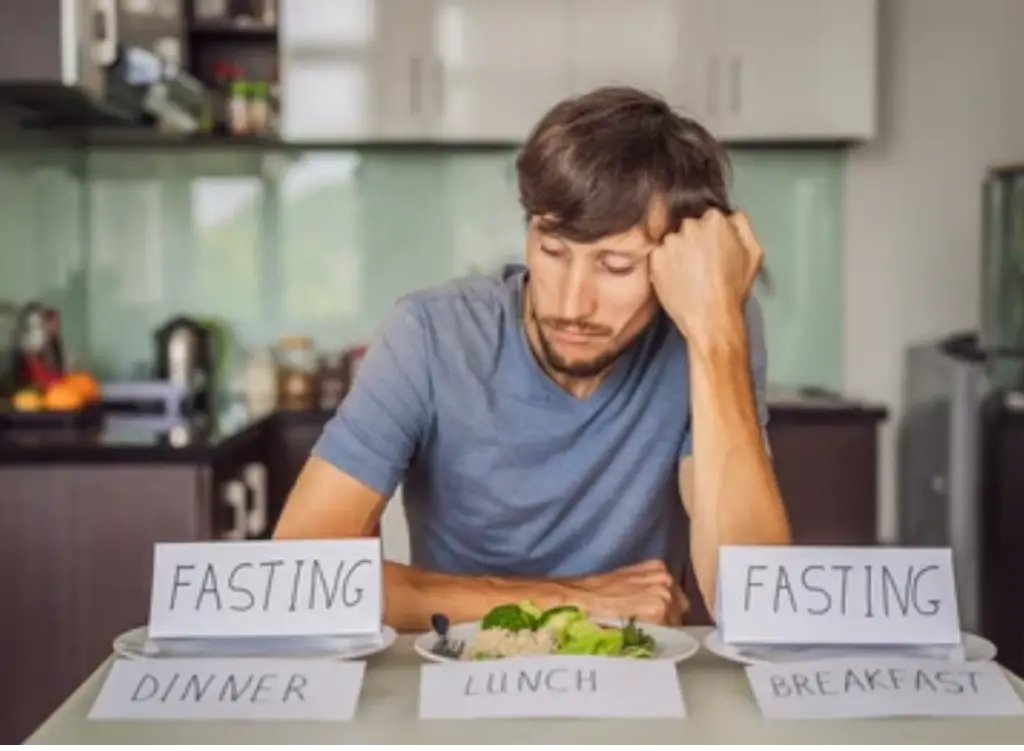Intermittent fasting is an eating pattern that involves going extended periods without food, and these fasts are generally conducted on specific days.
For some people, especially office workers with a Monday to Friday job, this poses a challenge when it comes to planning their weekly fasts.
If you’re someone who only has the weekends to fast and can’t do the same routine on weekdays, here is how you can still fast intermittently on Saturdays and Sundays.
The good news is that you can definitely implement intermittent fasting only on weekends. The trick is understanding how it works and tweaking your schedule accordingly.
Here’s everything you need to know about IF and its variations on just the weekend.
Related
Can I Do Intermittent Fasting Only on Weekends

There’s a lot of debate about whether you can do intermittent fasting only on the weekends. Many people think that skipping out on eating during the workweek is incredibly disruptive.
In reality, it doesn’t have to be. Intermittent fasting can be done at any time of the day or week.
Intermittent fasting is all about eating your meals in a certain window of time, and restricting food intake outside that window. If you’re going to be skipping breakfast, then you might be able to do intermittent fasting on weekends.
You can also split your fasting days into multiple parts, such as one day of eating normally, one day of eating less than normal, and one day of eating nothing at all. It’s important to find out what works best for you when it comes to timing your fasting habits.
Some people do better if they eat fewer calories on their fasting days, while others thrive on the opposite strategy. It’s all about finding what works for you, so if you’re just starting out with intermittent fasting, start with short periods of time and gradually increase the length of time over time.
How to Fast Intermittently on the Weekends
If you want to fast intermittently during the week but cannot because of work, you can also do it on weekends. Depending on what eating schedule you want to follow, you can also start any other eating schedule on the weekend.
The key here is to make sure you’re not eating heavy meals when you’re not fasting. If you’re trying to lose weight, it’s probably better to eat your heaviest meal first thing in the morning on the weekend, and then have a lighter meal (maybe a salad or some broth if you don’t like eggs) around 3 p.m.
Another option is to just skip breakfast altogether, but still stick to your fasting schedule. If you try this, please note that skipping breakfast can actually lead to overeating later in the day.
So if you want to skip breakfast, make sure that you don’t try to go beyond your usual meal times or skip lunch altogether.
When you start an intermittent fasting eating schedule, you have to take time to adjust to it. This means your stomach may be feeling uneasy and you may be more tired than usual. This is normal and should go away after a few days as your body gets used to the new eating schedule.
Here are some tips for intermittent fasting on the weekends:
1. 16/8 Fasting on the Weekends
The 16/8 intermittent fasting schedule involves eating within a 8-hour window and fasting for 16 hours. The 16/8 method can be done on the weekend, but you need to make some adjustments.
When you’re fasting on the weekend, you have to extend your fast to 18 hours. So, what this means is that instead of ending your fast at 8 p.m. on Saturday and Sunday, you need to push it to 10 p.m.
The same applies to the 8-hour eating window. You need to push back the window to 9 a.m. to 5 p.m. This means that during this period you need to eat twice to make sure you get the required daily nutrients.
2. The Dawn-to-dusk Fasting Schedule
This is a fasting schedule that involves fasting during the day and eating at night. This schedule is mostly used by people who practice a specific eating pattern known as the 5:2 diet.
For the 5:2 diets, a 28/5 fasting schedule is recommended. This can also be done on the weekends, but you need to make some adjustments.
When fasting during the day, you need to extend the fasting period to 22 hours. And the consuming period at night should be extended to 11 hours.
This means you will consume your first meal at 11 p.m. and your last meal at 8 a.m. The good news is that you can still fast intermittently on the weekends.
3. Weekly Intermittent Fast: 24 Hours Only Once a Week
If you have a busy schedule that doesn’t allow you to fast on the weekend, you can try doing a weekly 24-hour intermittent fast once every week, preferably at the end of the week.
This fasting schedule has the same health benefits as the other intermittent fasting schedules. You will experience weight loss, improved blood pressure, and better insulin sensitivity.
You will also improve your productivity and focus. However, you need to be careful not to do this for long periods of time because it can lead to nutrient deficiencies if done for an extended period.
4. Saturday Morning Fast
This fasting schedule is when you start your fast on Saturday morning and end it on Sunday afternoon. Depending on how long you want your fasting schedule to be, you can decide when to end it.
If you want to do a 4-hour fasting schedule once every week, you should start it at 10 a.m. and end it at 2 p.m. The key here is not to eat anything between 10 a.m. and 2 p.m. on Saturday and Sunday.
You can have water, coffee, tea, and plain water. But you should avoid soda, juices, etc.
5. Sunday Big Breakfast and Dinner Fasts
This fasting schedule involves having a big breakfast (whatever you like) on Sunday and then having dinner at your usual time. You should not eat anything between those times. This can also be done once every week or two.
You can have dinner on Sunday and then wait till dinner time on Monday to eat again. This is better than skipping breakfast. You don’t have to eat a big meal for breakfast on Sunday, but it should be enough to sustain you till dinner time on Monday.
The Goodness of Intermittent Fasting on the Weekend

Apart from all the health benefits of intermittent fasting, it also helps with weight loss. Intermittent fasting can help you lose more than 5 pounds in just a few weeks. This is because you’re eating less and most of the calories you are consuming are being burned as energy.
Another great thing about intermittent fasting is that it helps boost your metabolism so you are burning more calories even when you are not fasting. When you are fasting, your body goes into a state of ketosis which helps in burning more fat and especially the harmful fat in your body.
Depending on the fasting schedule you are following, intermittent fasting can also help you improve your focus and productivity. Studies have shown that fasting can help you increase your cognitive function.
So, if you are having a busy week at work or are having trouble focusing, you can try to implement intermittent fasting as an eating pattern in your weekly routine.
Frequently Asked Questions
Can you intermittent fast only some days?
In theory, you should be able to do intermittent fasting just on weekends (or any other days that work for your schedule). Just remember that it’s best to spread out your fasting periods over the course of your normal day so it fits in with your lifestyle. For example, instead of doing half-day fasts one day and full-day fasts the next, try doing 12 hours on Monday and 8 hours on Saturday.
Do you have to intermittent fast every day?
A lot of people ask if you have to intermittent fast every day, and the answer is no. So if you’re going to intermittent fast every day then yes, it might be hard on your body because it’s getting used to being fed less often. But if you only do intermittent fasting as often as you feel comfortable with and only when it suits your schedule then there’s nothing wrong with that at all.
Can I have cheat days on intermittent fasting?
Yes, you can have cheat days on intermittent fasting. Just make sure you don’t go crazy. If you’re trying to lose weight, then it’s best to stick with your normal diet plan. The idea behind cheat days is that they help reset your metabolism and allow you to enjoy high-calorie foods without going overboard. You don’t have to do this every week, but it can be a good way to maintain your sanity during a long fast.
What happens if I break intermittent fasting for a day?
The great thing about intermittent fasting is that it’s pretty flexible, and that you can do it in whatever way suits you best. But if you’re doing intermittent fasting correctly — which simply means that you’re following a particular pattern — then breaking your fast shouldn’t be something you do often. In fact, it should only happen once or twice per week at most.
Can you have a cheat day with 16 8 intermittent fasting?
Eat whatever you want in one day (or two!) and then go back to your regular eating pattern. I would say that the first two options are okay as long as you don’t overdo it. You don’t want to go crazy with your cheat meal or cheat day because then you will just undo all of the good things that intermittent fasting did for your body and mind.
Conclusion
Intermittent fasting is a great way to lose weight, but it can be hard to find the time to do it during the week. If you have a busy work week and don’t have time to fast, you can definitely eat your regular meals on Monday through Friday, and then pick up where you left off on the weekends.
This can even help make the IF easier on your body because there’s an extra day or two between fasts; if you try to go right from one fast into another, your body will still be in ketosis, which may make it harder for you to get back into a normal pattern on your eating.
After a weekend of fasting, you’ll go back into your regular food routine with more energy than before. The weekend break will also help keep your mind focused on eating healthy instead of thinking about how hungry you are.
Fasting is also a great habit for days when you’re busy at work and might not have access to healthier foods; by skipping meals during the week and just picking them up again during the weekend, you won’t feel like such a bad thing about grabbing takeout when you’re starving and don’t have time to make anything else.















